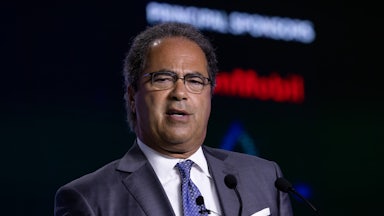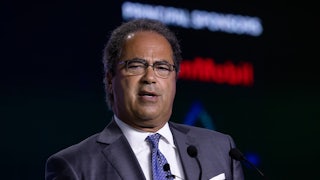If there’s a lesson in last week’s uproar over a U.S. consumer watchdog agency raising concerns about gas stoves, it’s this: Clearly, we should expect every possible segment of climate policy going forward to be subjected to an exhausting, corrosive, and unintentionally funny culture war.
In fairness, climate-watchers saw this writing on the wall in 2021, when a consortium of the world’s largest gas-exporting countries submitted a document to the United Nations calling any attempt to decrease reliance on fossil fuels a “cancel culture on hydrocarbons.” (The gas industry is not really canceled.) Did you know that in 2019, former Australian Prime Minister Scott Morrison warned citizens that a push to incentivise electric vehicles would literally “end the weekend,” due to their piddly, weak electric motors? In 2021, a fabricated panic emerged about the Biden administration limiting steak purchasing, leading to Representative Marjorie Taylor Greene labeling Biden the “Hamburglar.”
It’s funny—except that it’s not: Culture wars have material consequences. So-called environment, social, and governance–based investment, or ESG, is now being criticized as left-wing cultural propaganda, leading to the state of Texas barring governments from doing business with banks that appear to be making ESG-informed decisions. That’s costing the state, to the tune of billions of dollars. There are many real reasons to criticize ESG, particularly as a forum for greenwashing, but it is very, very far from a progressive conspiracy.
Last week’s gas stove panic was a gem of the genre: a slight hint of potential, maybe, sort-of regulation of gas-burning stoves in households ignited a mass cultural performance across the American right. Although gas stoves have been linked to childhood asthma and increased cancer risk, in addition to greenhouse gas emissions, several Republicans amusingly declared that they’d expire physically clutching their methane-powered appliances, if the government tried to take them away. Prominent right-wing account “Catturd” bragged about pointlessly running their gas stove to own the libs. Representative Mike Garcia wrote, with maximum sincerity: “Imagine a world where all tortillas are heated in the microwave.” Coal baron and Democratic Senator Joe Manchin confusingly declared that “the last thing that would ever leave my house is the gas stove that we cook on.” Why are the things in his house leaving? Does Joe Manchin personally cook on any kind of stove on a daily basis, for that matter? We’ll never know. His tweet, along with most other reactions, was amusingly baffling.
As Nitish Pahwa wrote in Slate, the reports of looming regulation inspired a slew of absurd conspiracy theories about a “sudden coordinated attack” on gas stoves, despite their health and climate risks having been reported, and some level of regulation advocated, for many years now. This minefield of madness stemmed from the Consumer Product Safety Commission planning to solicit comment on the potential health issues of gas stoves in March this year. There does not seem to be any coordinated regulatory push on this—not from the CPSC or the Biden administration. If there is one in the future, it’ll only apply to new purchases, rather than fitting the widely held conception of Biden’s armed forces literally invading homes to remove gas appliances. It is a wild overreaction to a very mild piece of news.
So what does this manufactured panic about federal agents seizing your stove accomplish? Well, it obscures the fact that there has been a steady drumbeat of scientific investigation over the past decade revealing numerous health risks from operating gas stoves inside homes. These dangers, involving for example nitrogen dioxide and benzene emissions that can occur even when the stove is off, are separate from the long-confirmed climate damage of burning and releasing methane gas.
And therein lies the real danger going forward: This slowly growing body of evidence will likely inspire a backlash quite unlike the culture war of the past weeks. It will take a far more insidious, effective, and powerful form: that of pseudoscience, doubt, and disinformation.
There is a rich and detailed precedent for deception being used to delay the demise of fossil fuels. Emulating the campaigns of the tobacco industry late last century, scores of front groups and lobby groups spent decades attacking climate science—and scientists—while paying friendly politicians and public figures and exploiting a credulous and unprepared media industry. Geoffrey Supran and Naomi Oreskes, two of the leading researchers on this phase of recent climate history, last week published a study revealing oil and gas giant Exxon Mobil had accurately and skillfully modeled the climate impacts of its products yet continued to spend huge sums casting doubt on the very science that internally was telling it of impending doom if we continued down that path. It’s chilling reading: Grave scientific findings inspired only a doubling down on deception and delay.
The current state of scientific research around the ill effects of gas stoves is ripe for a campaign of industry-sponsored disinformation like ExxonMobil’s late last century. As TNR’s Heather Souvaine Horn wrote last year, there is an emerging consensus around there being some association between gas stoves and asthma, though the magnitude and manifestation of this effect remains subject to some degree of uncertainty.
It is at this exact stage of scientific investigation that doubt-based disinformation campaigns have their greatest impact—uncertainty regarding the magnitude of effect can be twisted and reframed as uncertainty about whether there is an effect.
We’re already seeing early elements of a disinformation campaign from industry and fossil fuel advocates on social media. A 2013 study finding no link between gas stoves and asthma, promoted initially by the American Gas Association last year, was again spreading across social media last week in an effort to present gas cook stoves as safe. This is despite the 2013 study’s reliance on self-reported questionnaires and despite one of its co-authors pointing out that his other research has suggested a link.
Other research studies have become the subject of conspiracy theories. The comments from CPSC coincided with the release of a study led by the nonprofit Rocky Mountain Institute, an organization that advocates for electrification of buildings. That study was conducted in conjunction with independent public health experts in Australia, published in a peer-reviewed journal, and partly funded by the National Cancer Institute. It’s one of a long string of studies going back to the 1970s. Despite that, the study became the subject of a rapidly spreading conspiracy theory that the push against gas stoves is being secretly puppeteered by Big Induction—or some other vaguely defined set of corporate interests that would profit from electrification.
A December 2022 report in the International Journal of Environmental Research and Public Health linking #natgas #cooking with #asthma is not substantiated by sound science. Read the full statement: https://t.co/tD8C7YTF3z pic.twitter.com/8Hh44PUpeH
— AGA (@aga_naturalgas) January 10, 2023
The gas industry has also been citing research relating to the use of ventilation and air extraction devices, in an effort to shift the blame for its toxic products onto users “incorrectly” using gas stoves. Michael Thomas, author of climate newsletter Distilled, details how this partial truth badly misleads people about the extent to which they can mitigate the health risks from gas stove emissions—the best evidence shows we need to remove the source of pollution entirely. It’s another area in which casting doubt on a complex area of research serves the needs of the industry.
While gas stoves are only a small proportion of domestic gas consumption in the United States, they remain an important anchor for gas companies fighting to protect the installation of new pipelines and gas connections to homes, restaurants, and larger buildings. Journalist Rebecca Leber has written in detail about the social media influence campaigns being deployed by the industry, and Drilled’s Amy Westervelt has detailed incredible stories of gas industry lobbying (such as a threat to bus in potentially Covid-infected protesters to stop legislation banning gas connections in Southern California).
Gas infrastructure is permanently vulnerable to being kicked into a death spiral, where more people ditching gas burdens companies with unchanged fixed infrastructure costs and plummeting revenues from gas sales. That has inspired panic from the industry. A rising number of proposed and enacted gas connection bans has been met with an incredible slew of legislation preemptively banning the gas bans before they even happen. This fight is already nasty, and it is only getting more so as the climate crisis worsens and the price of gas fluctuates wildly.
Don’t dismiss the consequences of last week’s flash-in-the-pan culture spat. The sincere proclamations, as funny as they are, will have probably succeeded in spooking agencies and politicians looking to protect citizens from being locked into reliance on dangerous fossil fuels. It serves the industry well to lay these emotional land mines, where an epidemic of viral madness is triggered when tripped by even the merest suggestion of regulation of insidious fossil fuel reliance. The technique has served the industry well—I lived through the right wing in Australia permanently toxifying carbon pricing using this technique.
But the looming slow-burn disinformation campaign will toxify the information space in deeper and more damaging ways. Once the doubt about well-established scientific links sets in, it takes years and years to recover. Given the way the fossil fuel industry is under siege on various fronts, it’s almost certain to attack the emerging science of immediate health impacts, even if that only adds a few extra months or years of life to its inevitably doomed industry. It’s certainly hoarded enough conflict cash to pay for it several times over.
It is vital that politicians, media outlets, and citizens pay close attention to the telltale signs of this kind of disinformation. Media outlets in particular need to avoid the instinct to provide false balance to science, a habit that played a major role in the spread of climate change denial in the 2010s. Social media platforms will doubtless be exploited to spread industry messaging (likely through various weirdly named front groups like “Citizens for accurate science in the kitchen,” or something similar). All that will feed directly into the legislative battles happening at various levels across the U.S., and likely in many other places in the world.
We know the sordid history of the fossil fuel industry’s nasty relationship with scientific inquiry. The recent revelations about the raw scientific detail of Exxon’s knowledge of the climate threat paint a cold, sinister picture of how decision-makers in these companies behave when they’re facing emerging evidence of their products causing extreme harm to their customers. The only way to push back against fossil fuel disinformation is to identify and counter their campaign before the doubt they fund takes hold in society.










